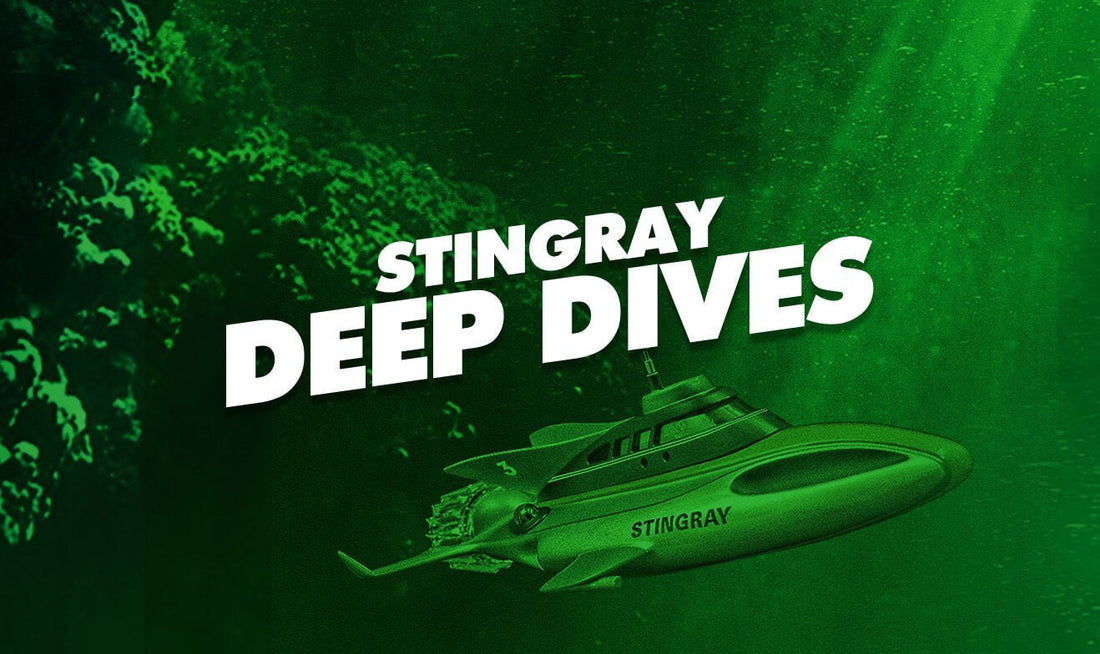Stingray Deep Dives #9: The Disappearing Ships

Welcome to our Stingray Deep Dives! As we surge towards the super-sub's 60th anniversary, we asked you to pick your favourite episodes of Gerry and Sylvia Anderson's classic 1964 sci-fi underwater series that should receive in-depth, analytical retrospectives. Based on your picks, we've collated a top 10 selection of Stingray's greatest episodes to receive a review - as voted for by you!
We're continuing our countdown of Stingray's top 10 episodes with a mystery of vanishing vessels which leads to a deadly entrapment for Troy and Phones...
Morally Grey Aliens

Produced near the middle of Stingray's production run but not initially broadcast until towards' the series end in the summer of 1965, The Disappearing Ships is a splendid showcase of the morally unpredictable alien civilisations who exist within Stingray's world and the confident directing of Supermarionation stalwart David Elliott. It's a dexterous fusion of creative storytelling and accomplished filmmaking. In The Disappearing Ships, the suspicions of the WASPs are aroused when a trio of decommissioned freighters are sunk before self-destructing. The Stingray crew discovers that the freighters have been deliberately sunk by an underwater alien race that wishes to recycle them into becoming new homes. However, the vessels' automatic destruct sequence is still in play, leaving Troy and Phones trapped in a game of underwater Russian Roulette with a disbelieving underwater nomad who sees them as an enemy.
Stingray gently pushes the boundaries in its depiction of alien civilisations compared to Fireball XL5. In that preceding series, most aliens are treated in an antagonistic fashion in a clear-cut moral fashion. However, Stingray evolves this approach in a less black-and-white manner, depicting the gulf between terranean and underwater civilisations as being susceptible to mistakes in intentions. Sea of Oil and The Ghost of the Sea are similar in this style.
Convincing Puppetry

Director David Elliot was a resoundingly steady pair of hands in AP Films' early successes. He came from a similar background as Gerry Anderson with this knowledge of film editing. This combined skillset of editing and directing undoubtedly enabled Elliott to work with a keen technical and creative eye for understanding the artistic style and physical capabilities of puppets. We open the episode with a lovely mood-setting panning shot of the deck of one of the freighters being geared up for self-destruction by Troy and Phones. With this single tracking shot, we're establishing a simple yet effective visual tone for the episode.
Elliot's skills shine in the episode's more low-key moments. The scene of the Marineville crew enjoying a game of faux poker at Commander Shore and Atlanta's apartment captures the found family feel of Stingray's cast, able to be comfortably playful in each other's presence away from defending the seas. The subtle back-and-forth cutting between Shore and Atlanta, who strikes different poses as she searches for a missing candy box, are a neat encapsulation of how handy Elliot's editing skills influenced his directorial eye. This accomplished mixture of fluid body movements from Atlanta and smiler and frowner heads during the poker game highlights the immense skills of Stingray's puppetry and filmmaking teams.
The Disappearing Ships also makes effective use of close-up inserts of real human hands operating various controls, an oddly common feature in Elliott episodes. His Thunderbirds episodes Vault of Death, The Duchess Assignment and 30 Minutes After Noon also made liberal use of this tactic, something that fellow Stingray director Alan Patillo wasn't always convinced by!
Underwater Prisons

Stingray's portrayal of alien races varying in their motivations as enemies, allies or otherwise neutral parties was a narrative weapon used quite sparingly over the course of the series. As such, The Disappearing Ships gains a menacing undercurrent when Troy and Phones become captive by Parasitica of a nomadic tribe, the creature responsible for the vessels sinking. The idea of abandoned terranean vessels becoming acquired by underwater civilisations is intriguing to pour over. What other types of vessels have other races commandeered, and for what purposes? Evidently, this was a popular trop by scriptwriter Alan Fennell. He uses a similar set-up in The Ghost Ship, but the idea of underwater races utilising human ships was first used by Fennell in the TV Century 21 storyline Escape from Aquatraz. Often mentioned in the TV series but never seen, this underwater prison is fashioned from several decaying hulks of terranean vessels, repurposed and reinforced to become a sprawling prison of Titan's.
In a masterful setup of suspenseful action, nobody can be sure which of the three vessels is timed to detonate first. Only when one of the neighbouring vessels that Troy and Phones aren't trapped in does Parasitica realise the error of his ways. Elliot pushes the capabilities of the puppets further by having Troy and Phones grapple with the trapped airlock, which is allowing powerful surges of water to slowly flood the ship's cabin. It's a rare and well-executed instance of these puppets interacting with violently spewing water.

With Troy and Phones ensnared within one of the sunken freighters, Marina is placed in charge of Stingray. Her interactions with Shore and Atlanta over Stingray's radio when Shore commands a refusing Marina to evacuate the area are oddly frustrating. It's an awkward hangover of the series that it never quite found properly satisfying methods to navigate Marina's muteness and have her be able to fully interact with others around her. This episode sees Marina tapping Stingray's microphones to elicit 'yes' or 'no' responses. This would be used again in Invisible Enemy, another Fennell-penned episode, and both episodes treat Marina's tapping as if it's the first time anyone's thought to use this method!
Still, Marina's devotion to staying within the blast zone is a welcoming showcase of her heroic side in the face of extreme danger. More convincing puppetry is at work here, with Marina displaying plenty of emotive body language as the danger of the situation swells. Sure enough, the Stingray crew and Parasitica break free from the remaining wreck and take off in Stingray before the final detonation engulfs the immediate area.
"It May Have a Use Someday..."
This simple, uncomplicated adventure focusing around the benefits of recycling has such buoyancy in Elliott's directorial hands. It's a shame we don't get to see the WASPs and Parasitica and his people depart on welcoming terms, but we do at least get the verbal sign-off that future unwanted vessels will be donated to the nomadic people. It's one of Stingray's adventures that forgoes any genuine villainy and instead conjures up its drama and action through resolvable misunderstandings between its players. One of Stingray's lighter episodes, made all the more watchable through its ambitiously pulled-off production techniques.
To be the first to hear about the latest news, exclusive releases and show announcements, sign up to the Anderson Entertainment newsletter!




![Thunderbirds Comic Anthology Volume One [HARDCOVER] - The Gerry Anderson Store](http://gerryanderson.com/cdn/shop/files/thunderbirds-comic-anthology-volume-one-hardcover-8030771.jpg?v=1751089031&width=720)
![All Sections Alpha: The Making of Space: 1999 [HARDCOVER] - The Gerry Anderson Store](http://gerryanderson.com/cdn/shop/files/all-sections-alpha-the-making-of-space-1999-hardcover-7498116.png?v=1757766647&width=720)

![Stingray Comic Anthology Volume Two – Battle Lines [HARDCOVER] - The Gerry Anderson Store](http://gerryanderson.com/cdn/shop/files/stingray-comic-anthology-volume-two-battle-lines-hardcover-107681.jpg?v=1738856151&width=720)
![Stingray W.A.S.P. Technical Operations Manual Standard Edition [HARDCOVER] - The Gerry Anderson Store](http://gerryanderson.com/cdn/shop/files/stingray-wasp-technical-operations-manual-standard-edition-hardcover-112278.jpg?v=1749664163&width=720)
![Stingray WASP Technical Operations Manual Special Limited Edition [HARDCOVER BOOK] - The Gerry Anderson Store](http://gerryanderson.com/cdn/shop/files/stingray-wasp-technical-operations-manual-special-limited-edition-hardcover-book-991914.jpg?v=1749657538&width=720)
![Stingray: The Titanican Stratagem – Signed Limited Edition [HARDCOVER NOVEL] - The Gerry Anderson Store](http://gerryanderson.com/cdn/shop/files/stingray-the-titanican-stratagem-signed-limited-edition-hardcover-novel-129251.jpg?v=1740558711&width=720)







